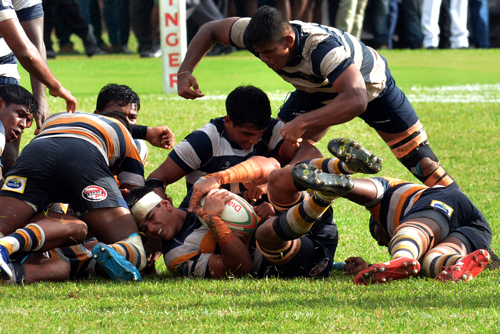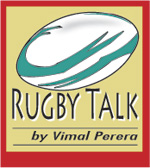How long is 30 seconds?
View(s): What would you do if you had 30 sec. to live? Most answer saying they will say sorry for this and that, and mostly to parents. Despite that there is only 30 sec., the answers never look logical in relation to time.
What would you do if you had 30 sec. to live? Most answer saying they will say sorry for this and that, and mostly to parents. Despite that there is only 30 sec., the answers never look logical in relation to time.Many things would have been on the minds of St. Joseph’s, as they defended inside their 22m. The blood-starved brain cells spread out in the midst of fatigue and the expectation of glory, blurred their thinking. With 30 sec. left and leading 21-20, they managed to lose a chance that eluded them for 60 years. To win the Schools League, as St. Peter’s kicked a simple penalty right. Joes also failed to retain the Weeratunga Shield. The Referee’s long whistle may have been like a siren in a torture chamber – dashing all their hopes. St. Peter’s keep alive their hopes for the Schools Rugby League, while the Weeratunge Shield returned to its home of birth.
The numbers of Blue & White that thronged the new St. Peter’s grounds, to see history being written, had to be content with tears. They woke up to realise that the plum of Schools Rugby was not going to be at the majestic home of St. Joseph’s College.
The Joes had a throw into the scrum inside their 22m, and in front of the upright. Only 30 sec. was left, when the Referee called for a scrum. It would have taken 20 sec. for the ball to emerge. On the other hand, if you took 25 sec. of the 30 sec., allowed time in forming a scrum, the League and the Weeratunga Shield would have touched the Blue & White grass of St. Joseph’s College.
An option was to kick the ball to touch. By the time the ball went dead, the time, in all probability, would have been over. Another option would have been to break from the base and create a safe platform, ensuring that time ticks and then render the ball dead. Both Joes and Petes did often break from the base, even inside their own 22m. The Petes, in my view, got into trouble by using the forward hit inside their 22m, and gave their opponents the first 3 scores. Joes, on the other hand, inflicted on themselves more pressure, breaking from the base, while slowing the ball.
In that crucial scrum, however, they opted against slowing from the base, but chose to send the ball back for a speedy Back Division player to crash at speed and go to ground. The speed was such that it isolated the player from his bunch, and he did not release waiting for support, thus conceding a penalty. If it was decided to crash, the best would have been to stay upright forming a maul, and if the ball did not emerge, a scrum and game over.
You go down and hold on due to lack of support, it is a penalty, which the Petes put over with glee. They stand a greater chance of winning the League. They have completed all their matches. Nearest Royal have one more game against the Joes and need to win with a bonus point to retain the League and push St. Peter’s into 2nd place.
The Schools’ Rugby season saw close contests in what ended as a 3-horse-race up to the penultimate week. That makes people think that Rugby is good. It is exciting, as the scores are close. The question is whether it is entertaining? Were skills good? If you see the number of times the ball is dropped or scrums are reset, while you get away fringing around rucks and mauls, and there is no quick release at the tackle, there is a lot to ponder. That makes me ask what are these coached for? To win; and how they do does not matter.
 Injuries during games are another concern. In the Wesley vs St. Joseph’s match, I counted 11 injuries. The 35-min 2nd half went on for 48 min. on the clock, as some injuries resulted in long stoppages. That slows down the game and inhibits good Rugby. The injury scenario is not limited to the match mentioned, but numbers keep coming out at most games.
Injuries during games are another concern. In the Wesley vs St. Joseph’s match, I counted 11 injuries. The 35-min 2nd half went on for 48 min. on the clock, as some injuries resulted in long stoppages. That slows down the game and inhibits good Rugby. The injury scenario is not limited to the match mentioned, but numbers keep coming out at most games.
Rugby starts at the school level and, for most, ends there. Has quasi professionalism in School Rugby made or broken players. One lament by parents is that the time taken for Rugby practices is as much as 4 hours and sometimes, in the morning as well as evening. The scenario of long hours is also common to Junior Rugby players. The concern of long hours has been endorsed by none other than Sri Lanka Rugby Technical Committee Chairman Ajith Abeyratne, commenting on social media Rugby news group.
Recently, I happened to talk to a Senior Official in Sports Science Department, who showed concern, not only of training long, but training wrong. He expressed worry about the diet and supplements allegedly consumed by schoolboy sportsmen. Who will change this culture, which requires less spending and more professionalism in dealing with the expectation from schoolboys?
The issue is reaching a peak, as it is understood that the Child Abuse Authorities are getting into discussions, to instill greater sense in dealing with children.
Vimal Perera is a former Rugby Referee, Coach and an Accredited Referees’ Evaluator IRB


